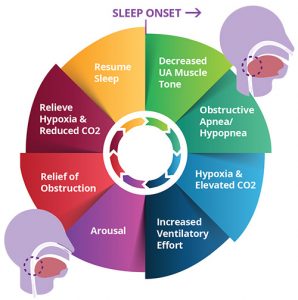
Take our quick quiz to see if you are at risk.
What is Obstructive Sleep Apnea (OSA)?
OSA is a sleep disorder that involves a cessation of breathing, or a significant decrease in air flow due to recurrent collapse of the airway during sleep. OSA affects 1 in every 5 Americans. Many patients go undiagnosed for years, which can contribute to a multitude of health problems such as:

- Stroke
Men with moderate to severe OSA are 3x more likely to have a stroke. - Hypertension
Sleep Apnea is an identifiable cause of high blood pressure. OSA is the leading cause of secondary hypertension. - Diabetes Type II
55% of people with Type II diabetes have OSA due to a lack of insulin control, and poorly controlled blood sugars.
How is OSA Diagnosed?
DMC Primary Care uses the Apnea Link Home sleep testing device. The sleep study is done in the comfort of your own home over the period of one night. The recorded time needed for this test is a minimum of four hours of sleep data. The test will show interruptions in breathing, oxygen desaturations, heart rate variability and levels of snoring. With this information we are able to identify the diagnosis and severity of OSA.
How is OSA Treated?
 Lifestyle changes
Lifestyle changes
For very mild sleep apnea, some of our patients first try lifestyle changes such as weight loss, smoking cessation, changing sleep positons (not laying on their back) avoiding alcohol or other sedative, and avoiding sleep deprivation. These are all very helpful changes to make.
Standard of Treatment for most patients
The standard treatment is a CPAP or oral appliance such as a Mandibular Advancement Splint or a Tongue Extruder Splint.
Surgical Treatment
This form of treatment requires a referral to an Ear Nose and Throat (ENT) specialist.
Conditions that may improve after treatment for sleep apnea
- Weight loss/ Metabolism
- Diabetes/ Pre Diabetes
- Mood/Memory/ Concentration
- Fatigue
- Headaches
- High Blood Pressure
Which Symptoms do You Have?
Daytime Symptoms of Sleep Apnea
- Fatigue
- Decreased memory/concentration
- Morning confusion
- Mood changes (depression/anxiety)
- Decreased libido
- High Blood Pressure
- Morning Headaches
Nighttime Symptoms of Sleep Apnea
- Snoring
- Witnessed Apneas (periods of time where you stop breathing)
- Gasping/Choking which interrupts sleep
- Nocturia (getting up to use the bathroom multiple times per night)
- Insomnia
What to Expect at a Consultation
If you feel like you or a loved one may be suffering from OSA, please call us to set up a sleep consultation. The specially trained providers on the Sleep Medicine Team will meet with you to discuss the program and answer any questions. You will undergo a series of appointments as outlined below.
Sleep Consult
You will meet with one of our providers and they will clinically evaluate you to assess your risk factors for OSA. They will be able to tell you if you are a candidate for a Home Sleep Study, and answer any questions you may have.
Nurse Visit
During this visit, you will be fitted for the ARES device and instructed how to use it. This is a quick appointment with no-copayment.
Prior to this appointment DMC will see if your insurance requires a prior authorization for testing. Regardless, we urge you to check with your insurance to see what your out-of-pocket cost will be, if any. (CPT Code 95806)
Sleep Follow Up
You will meet with your sleep team provider again and he or she will go over your sleep study results. They will confirm a diagnosis with you and set you up with a treatment plan.
